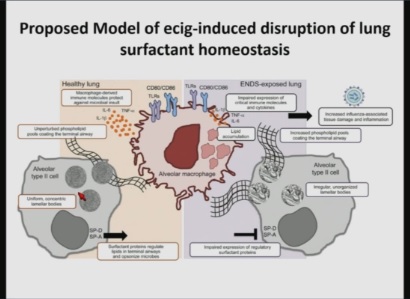Pathological Findings: Histological findings include lipid-laden macrophages. Experimental data in mice shows that THC containing E cigarette fluid, but not nicotine containing E cigarette fluid, leads to a disruption of surfactant homeostasis. It is thought that this process leads to lipid accumulation within macrophages. These findings have led some to consider EVALI a form of lipoid pneumonia.

Treatment: Patients generally respond well to steroids. Among 140 cases reported nationally to CDC that received corticosteroids, 82% of patients improved. Per the CDC, early initiation of antibiotic coverage for community-acquired pneumonia should be strongly considered. Among patients treated and discharged with oral steroids, readmissions have been rare. Patients should of course avoid smoking and vaping.
Future directions and recommendations: Researchers are still attempting to determine the causative agent for Ecigarette vaping associated lung injury. Thus far, signs point to a chemical introduced into THC containing vape liquids. CDC recommends that people should not use e-cigarettes, or vaping products that contain THC. CDC also recommends that people should not:
- Buy any type of e-cigarette, or vaping products, particularly those containing THC, off the street.
- Modify or add any substances to e-cigarette, or vaping, products that are not intended by the manufacturer, including products purchased through retail establishments.
Of course, since the causative agent has not been found, the only way to eliminate the risk of EVALI is not to vape any ecigarette product at all.
Deep Ramachandran, M.D. is a Pulmonary, Critical Care, Sleep Medicine physician, founding CHEST Journal Social Media Editor, and co-Chair of ACCP Social Media Work Group. He blogs at Caduceusblog and the CHEST Thought Leaders Blog. He is on twitter @Caduceusblogger.
